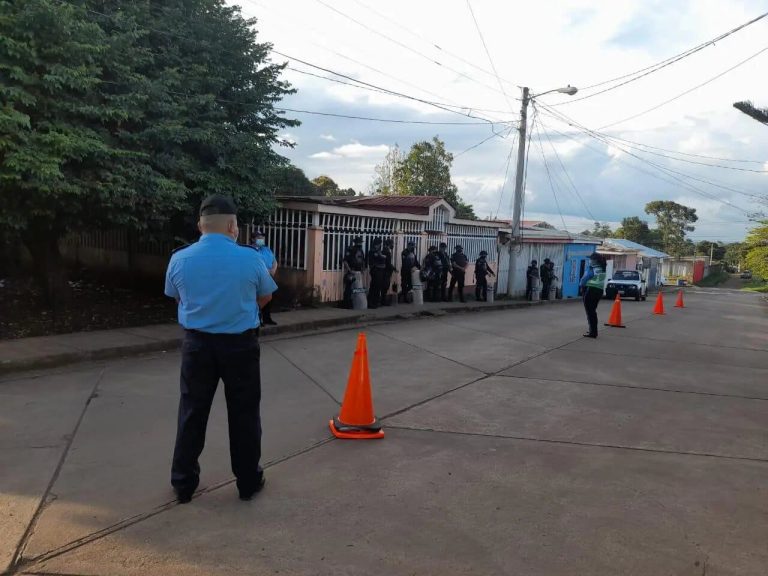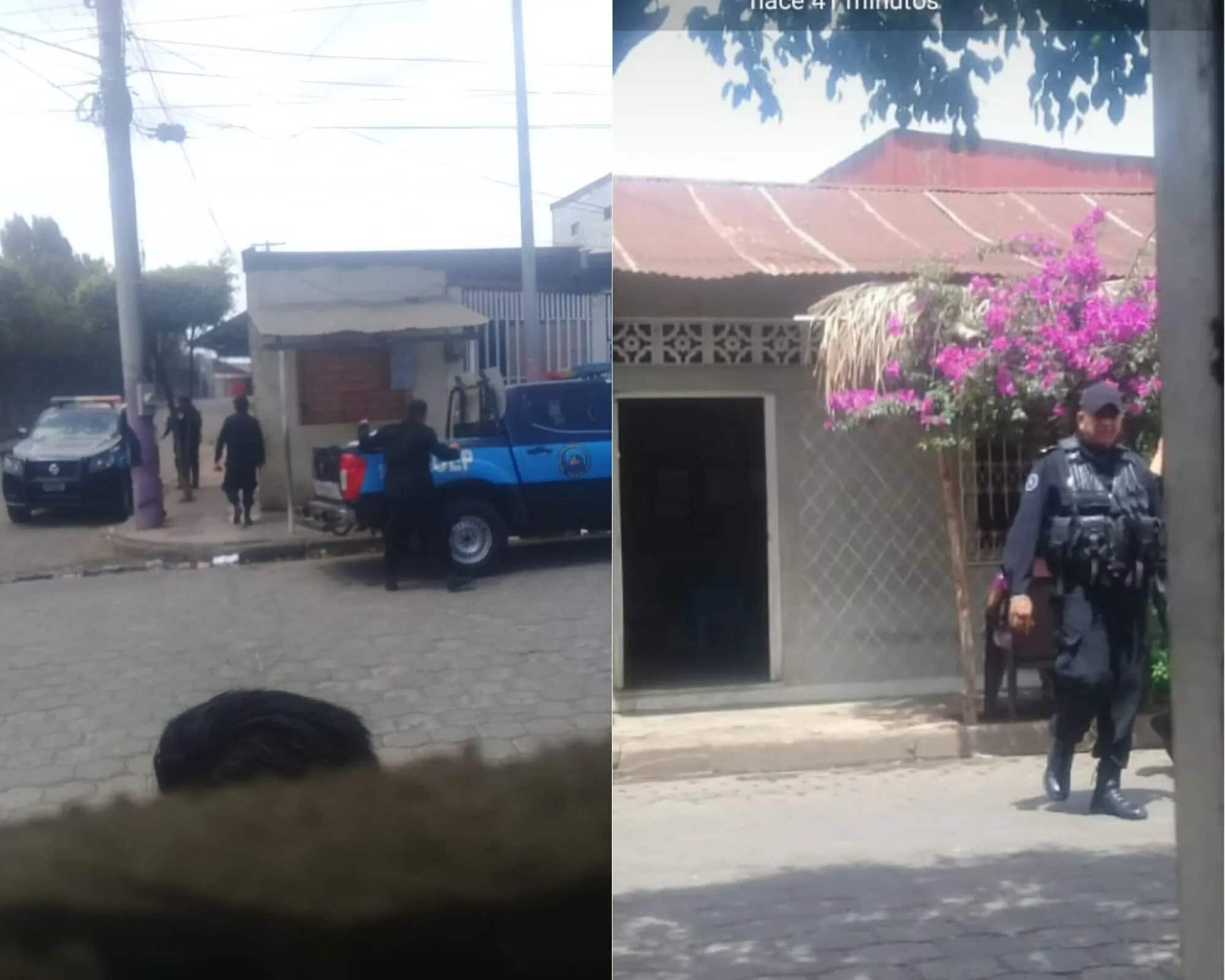6 de abril 2021

Children of Exile: The Births “Sowing Hope” in the Camp of Nicaraguan Farmers

PUBLICIDAD 1M
PUBLICIDAD 4D
PUBLICIDAD 5D
Ortega’s order is to keep up the police siege of houses in Masaya, Nueva Guinea, Bluefields and Managua, while neglecting citizen security.

This photo shows the police presence in front of the house of Jairo Quiroz, in Nueva Guinea. // Photo: Courtesy.
Nicaraguan Police kept up its siege during Easter week against several opposition figures. Confidencial spoke on Good Friday with some of those whose families are affected in Masaya, Managua, and Nueva Guinea.
Previously, on Holy Thursday, stories of other sieges in Jinotega, Managua and Boaco were also reported.
Both released prisoners and opposition leaders suffer harassment and police persecution, in retaliation for their involvement during and after the April 2018 Rebellion. Many of them have denounced suffering a sort of de facto house arrest, in which they are prevented from leaving their homes, even to work, or to go to the grocery store to buy food.
This is what happened to the family of political prisoner Edward Lacayo Rodríguez, of Monimbó, Masaya, at dawn Friday. “At 4:30 am, two pick-up trucks with regular and riot police surrounded the house, banging on doors and gates,” says Karen, the prisoner’s sister.
Hours later, at 11:30 a.m., several relatives, along with a five-year-old boy, tried to leave the house to buy food, but when they opened the gate, they were surrounded by riot police that prevented them from leaving.
The tension is so great that Karen and Edward’s mother, Estela Rodríguez Zelaya, 70, recorded an audio to send a desperate SOS message. “Good afternoon, Nicaragua. The Police are besieging us, they are beating us. Be alert Nicaragua, support us, help us. Come, come and support us. These evil people are going to kill us. For God’s sake, give a cry of alert, please,” she cries out before breaking down in tears.

The family of political prisoner Edward Lacayo, also denounced the police harassment at their home in Monimbó. // Photo: Courtesy.
Karen recorded another audio in which she identifies herself as a sister of Edward,” who is in a maximum-security cell at the La Model penitentiary. “He has served two years since his kidnapping on March 15, accused of false crimes,” such as drug-trafficking, she details.
She narrated the police deployment, which included three patrol vehicles. Karen noted that a five-year-old child, a 16-year-old boy, and her 70-year-old mother, “who suffers of diabetes and hypertension,” live in the house, plus four other people. Karen calls on the international community and foreign media to make their situation known. “We can no longer endure this siege and persecution, just because we are relatives of a political prisoner, and because we do not agree with what Daniel Ortega is doing with Nicaragua.”
To demonstrate their daily drama, the family released a video in which police officers are observed challenging the Lacayo family by hitting the metal gates, while another of them swats at the cell phone through the fence, which the family interpreted as an attempted theft.
Jairo Quiroz is a member of the Municipal Board of the Civic Alliance in Nueva Guinea. He declares himself “an opponent (of the Sandinista Front) since 1996, seeing that political system leads to nowhere. I’ve been involved in the politics of Zelaya Central,” he says recalling that he was vice mayor twice, and a candidate for the National Assembly in the 2011 elections. “Which I won, but the FSLN took it away from me.”
Quiroz still remembers the day when “Lester Aleman and other university leaders met at my house. Since then, we have suffered a terrible siege, and my daughter was fired the next day from the cable company she worked for, supposedly on orders from the FSLN,” he recalls.
Since then, he has had to share confinement with his wife, his two children and a granddaughter. The siege persisted during the days of Holy Week.
“They do not let me go out, and do not let anyone in,” although sometimes they manage to go shopping, he explained. His theory is that the regime pretends “to prevent us from carrying a message of hope, freedom and democracy, to the leaders of this community.”
Although he is not suffering the levels of psychological aggression of the Lacayo family in Monimbo, Quiroz says there has been verbal aggression, but not physical.
Instead, he has been able to have some kind of cordial dialogue with a police chief who even showed understanding of the Nicaraguan people’s struggle. On other occasions, the agents sent to try to intimidate him “stay here for 20 or 30 minutes, take a photo so the boss can see that they came, and leave.”
What does concern him is the presence of “fanatics who threaten to burn down my house. That is to intimidate us, to see if we lower our guard, and stop carrying the message of hope to the population,” he said.
Martha Lorena Alvarado is the coordinator of the Civic Alliance in District VII of Managua, as well as the founder and legal representative of the Association of Relatives of Political Prisoners. She and her husband and children are harassed on a daily basis. The routine includes taking photos of the family, and the uniformed agents take selfies, “because it seems that they have to report themselves,” she speculates.
Alvarado narrates that “I walked in all the marches.” Then she participated in hunger strikes, marches, sit-ins, to demand her son’s freedom. He was released on December 30, 2019, with 90 others, “but there are many others who are still in prison,” she notes.
On March 8th of last year, while preparing to hold a feminist activity on International Women’s Day, “they surrounded and cordoned my house.” A female police officer told her very clearly that all this deployment was against her, and that they will stay all week, from 5:00 am to 12:00 or 2:00 in the afternoon, Monday through Monday.
Afterwards, on December 31, 2020, they broke into her house at four in the morning, banged on the doors, took away her children’s cell phones, and did not return them. They left some time later, after taking photos and videos “everywhere.”
“Although we work clandestinely, it seems that they know everything we do,” she asserted. Likewise, denouncing that her family nucleus must continue to be the object of state aggression.
For her part, she said she can only resist, and continue making complaints through the media.
The work of police siege continued this Saturday in front of the home of presidential candidate George Henriquez, of the Yatama indigenous party. His residence is located in the city of Bluefields, in the South Caribbean Region.
Henriquez, who was out of the city, arrived at his home at 9:34 in the morning and found nine armed agents, from whom he requested an explanation. He suggested that they investigate the crimes that occur daily in the country.
“This is almost every day, but one gets tired of filming it,” said the candidate during a live broadcast on Facebook. “I do not want this tension. Sometimes they come and I do not even pay attention to them,” he added.
The presidential hopeful believes that the Police should be apolitical. He questions the agents: “for serving a political party. Imagine if it were the opposite? Do you feel proud of this?” However, the nine officers did not respond to his questions and just took pictures of him.
“There is so much crime in the city and on the roads. You should be there, not here,” Henriquez pointed out to the Police. “Put yourself in the shoes of the other. What if you had nine armed men outside your house, where your family is, where your son sleeps, where your daughter sleeps?”
Archivado como:
PUBLICIDAD 3M
Periodista nicaragüense, exiliado en Costa Rica. Durante más de veinte años se ha desempeñado en CONFIDENCIAL como periodista de Economía. Antes trabajó en el semanario La Crónica, el diario La Prensa y El Nuevo Diario. Además, ha publicado en el Diario de Hoy, de El Salvador. Ha ganado en dos ocasiones el Premio a la Excelencia en Periodismo Pedro Joaquín Chamorro Cardenal, en Nicaragua.
PUBLICIDAD 3D